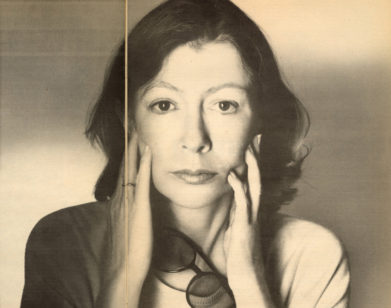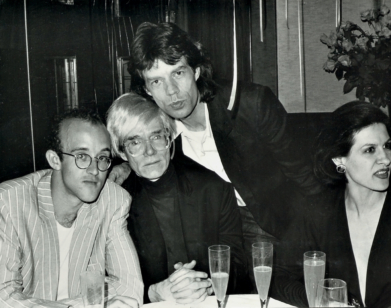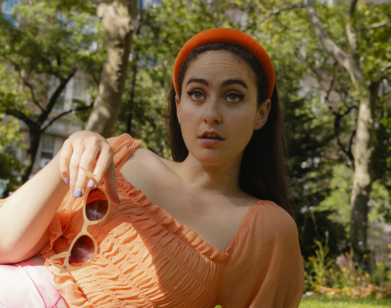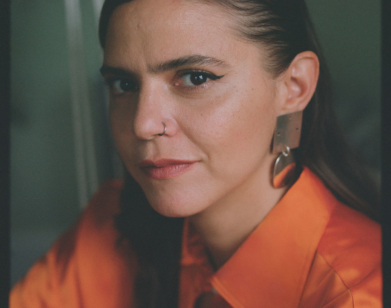modern woman
Catherine Cohen Isn’t Your Typical ‘Gal About Town’-Next-Door
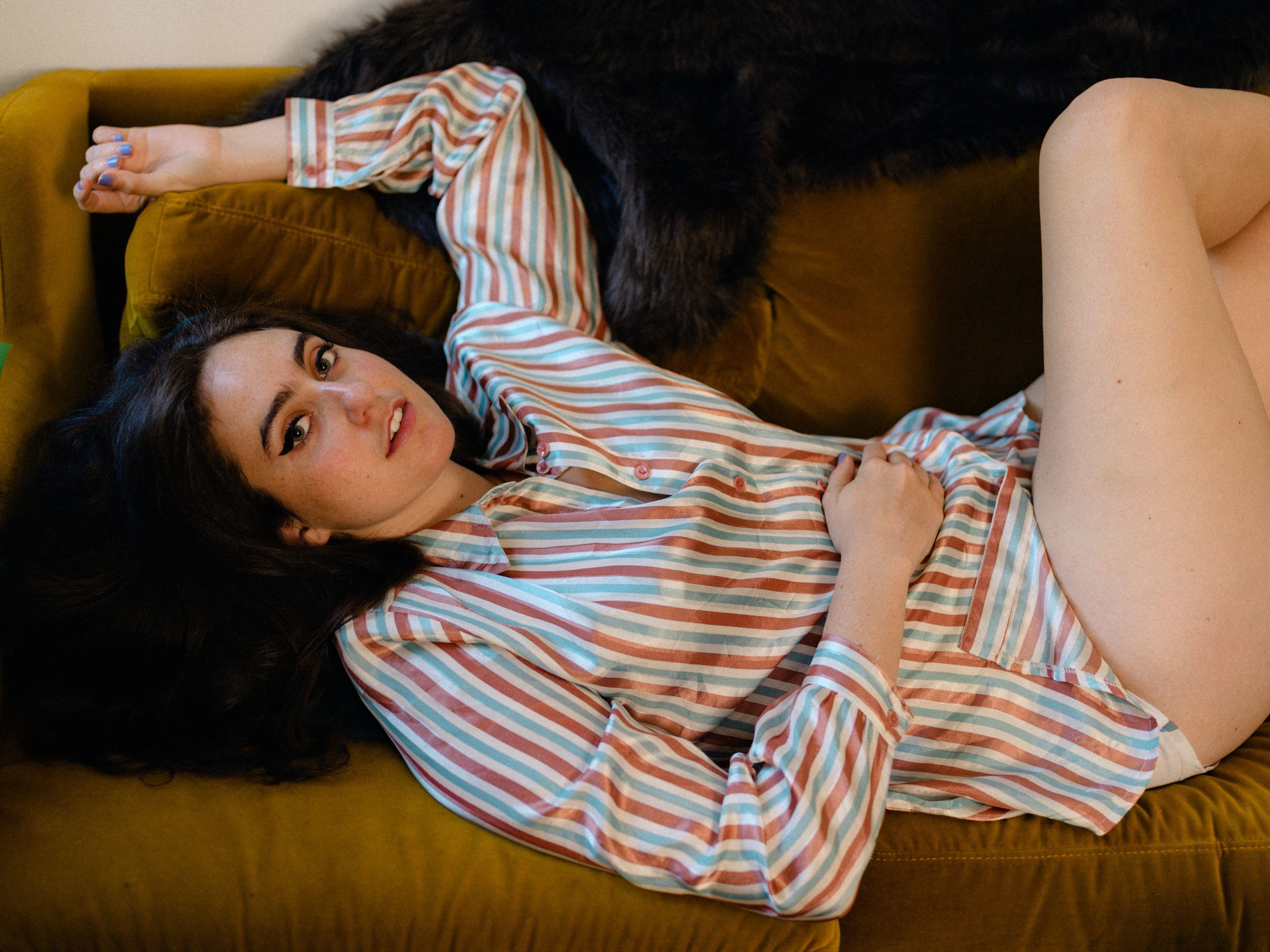
Catherine Cohen, shot by Molly Matalon for Interview in 2019.
A self-described “millennial Renaissance woman,” Catherine Cohen is a singer, comedian, writer, actress, podcast host, voiceover artist, and sporadic advice columnist. These days, she can also be found performing her weekly cabaret show, Cabernet Cabaret, which formerly took place at Club Cumming in the East Village, on Instagram Live. “I like to tap dance, but I’m not very good,” she adds to her assembly of skills. “And I can run, sometimes up to three miles.”
With her most recent accomplishment, God I Feel Modern Tonight: Poems from a Gal About Town, Cohen is adding poet to the list. The book, published by Knopf, is a pithy collection of the raw, bite-sized poems she usually publishes on Instagram. Cohen’s writing deftly walks the line between insightful and TMI, dropping vulnerability bombs like, “I’m finding quarantine to be an amazing time/to revert to the basest, most vile/version of myself I’ve worked years/to outgrow,” and “I wish I were smart instead of on my phone.”
After weathering a good chunk of the pandemic in her NYC apartment, with nothing but a mini-fridge to preserve her rations—“I would just make this big pot of soup and then hope for the best”—Cohen spent the latter part of the summer driving across the country with her boyfriend, Brian. She describes the road trip as “a dream:” camping in Yosemite, visiting Los Angeles, “America’s saddest haunted house,” and “doing the drug mushrooms [at] Instagram’s Joshua Tree.” The rest of their misadventures are chronicled both in the book and her weekly newsletter, My Sexy Little Email.
Cohen, sporting her signature cat eye makeup and a bedazzled headband, spoke with me over Zoom from her parents’ home in Houston, Texas, where she was visiting for the holidays. Brian wandered in and out of the frame as we chatted.
———
LUNA ADLER: Does it feel ironic to be publishing a book of poems from a “gal about town” when you’ve spent most of 2020 either in lockdown or road-tripping?
CATHERINE COHEN: Well, I kind of hope that by the time the book comes out, we’ll start being a bit more about town. But that’s why I wanted to add in those quarantine poems to show this is what happens. It’s for girls about town who are sometimes forced to be, uh, not in town.
ADLER: In one of your poems, you write about the “freaking rock n roll high/that comes from taking your mask off/for 13 seconds until someone/with a bichon frise needs to walk by,” which I think we can all more or less relate to at this point. Has quarantine felt like fertile creative ground to you?
COHEN: The book wasn’t completed at the beginning of quarantine and I kind of thought it was done and then my editor, who’s fucking amazing—her name’s Deb Garrison, she’s everything I want to be when I grow up—was like, “I think you should write some quarantine poems. I think it’s really important that the book feels of the moment.” After a few weeks, things just started really pouring out and I started writing quarantine poems and then poems on the road trip I went on. Working on the book was probably the most pleasant, easy, and rewarding professional experience I’ve had. Working with Deb and everyone at Knopf has been so fucking pleasant and lovely. They’d have actual, insightful thoughts about me writing a poem about, like, the shit on my ass. Just feeling respected and taken seriously was really nice, even though I’m doing stuff that’s often jokey or, you know, kind of disgusting.
ADLER: There are some real moments of profundity, though. We’re reading about potato chips at a bodega and then all of a sudden we arrive at this insightful moment that examines how heartbreak is inevitable and yet always feels new.
COHEN: That’s the goal. I don’t really care about jokes. So if something’s funny, that’s great. But, at least when I read stuff, I just want to feel like I’m reading someone’s secrets. Otherwise I don’t really care. Whenever people—obviously I’m thinking of guys—are like, “Hey, your poems are actually serious or good,” I’m just like, “Yeah, I know.” Like, duh. I just saw someone tweeted that they thought my poetry was bad and I’m like, god bless. If everyone liked it, it would be mortifying. Imagine everyone liking your work. What a nightmare.
ADLER: Reading your book, the narrator is so relatable to me in that they’re living in New York, trying to make it. As you become more and more successful, does that persona ever clash with your actual day-to-day experience?
COHEN: I feel like no matter what you get, it’s never enough. And so it’s more about realizing that and trying to detach from external validation, which is my new goal. Not going well. I think I’ll always feel like a girl trying to make it in NYC. It’s never over and I never want to leave New York and I never want to stop caring about things or wanting things. So in that way, the book is a timeless novel.
ADLER: Have you always wanted to write a book?
COHEN: As soon as I started writing the poems, I was just like, these should be a book. But no, I don’t want to write a novel. My god, I can’t even read a novel. I know I sound stupid, I know. Growing up, it’s all about novels, novels, novels. But in my twenties, I’ve been thirsty as fuck for non-fiction. I’m like, someone tell me how to live my life. Especially books by women, where they talk about how to be in the world. I treat books now as instruction manuals. I know I sound like an idiot, but people are like, the lessons in a novel apply to your life. And I’m like, I’m dumb. Feed me the good stuff.
ADLER: I saw that you’ve been fundraising through your newsletter, My Sexy Little Email. How much have you raised so far?
COHEN: Actually, I just added it all up yesterday, and we raised over $11,000 for the Loveland Foundation, which helps fund therapy for Black women and girls, which is crucial because literally everyone needs so much therapy.
ADLER: And therapy’s a big theme in your poems.
COHEN: Yeah, it’s funny because my parents don’t go to therapy and since I’ve been home for Christmas, my brothers and I have been like, “Y’all should go.” And they’re like, “Why? We’re perfect.”
ADLER: Does your therapist read your work?
COHEN: No, I think I asked her once and she was like, “No, I don’t look at it.” It’s funny you say it’s a big theme in my work because I’m like, is the therapy working? I don’t know. But every now and then she’ll let me push the boundaries. One time, I had a therapist and I wanted to show her a picture of someone I had a crush on. I was like, “Do you wanna see a picture?” And she was like, “Do you want me to see a picture?” And I was like, “Fuck off. Tell me he’s hot.” I don’t think she reads my work, but she’s probably lying.
ADLER: There is a line in your book—”If it’s embarrassing, it’s probably good”—that made me wonder about the overarching theme of exposure in your work. Do you use it as a barometer?
COHEN: I just know that I always feel most creative when I’ve just done something fucking stupid or if I’m going through something difficult or made some terrible mistake. If I’ve fucked up, I’m like, “Okay, it feels bad today. But probably even by tomorrow, it’ll feel like fodder.” The book is an exercise in that. Honestly it’s probably a little bit of a compulsive behavior that maybe is not always healthy, but I feel a weight lifted when I share these things that are personal. I’m newly in OCD-specific therapy, and my therapist is like, “Why do you feel the need to compulsively check in with that person or reveal that thing?” I’m like, “Okay, bitch. I’m paying you. Be nice to me.”
ADLER: That’ll end up in your poems.
COHEN: Yeah, exactly. Great fodder.
ADLER: In the more recent episodes of [your podcast] Seek Treatment, your boyfriend is often in the room while you’re recording, wearing headphones. Have you been doing a lot of your creative work with him nearby?
COHEN: Yeah, it’s funny. I’ve been in relationships where you work together and I didn’t want that ever again, but then quarantine has kind of forced us together, and I’ve been really pleasantly surprised. I feel like it’s unlocked a level of our relationship that I didn’t necessarily know was there. I’m just so in love. And now I don’t think I could be with someone whose opinion I didn’t value when it came to my work. He’s funny and he was helping me with the Instagram show by dancing around in his underwear. You gotta have a hunk nearby.
ADLER: Does having less privacy while you work influence what you’re creating?
COHEN: No, but I think there’s more stuff that I run by him. I’m thankful he’s such a good sport. I don’t think he’s ever said no. I can’t imagine being with someone who was at all self-conscious about their privacy in that way, because it wouldn’t really work out. But in terms of the actual writing, I still prefer to be in a room by myself. I’m very much Library Girl. I love complete silence, no one near me. I need a stretch of eight hours. Like, don’t fuck with me. I, famously, am obsessed with the YouTube channel “lo-fi hip hop.” It’s the most amazing work music. So I have my lo-fi hip hop, lots of coffee, water. I get in the zone, I get fucking hyped up. I’m like, let’s goooo.
ADLER: Backing up a bit, how old were you when you first started performing?
COHEN: I always loved singing a lot, I always liked performing. My family is really funny. My dad cracks me the fuck up. I have that song, “Boys never wanted to kiss me/So now I do comedy,” and that’s kind of the whole thing. I wanted to be sexually lusted after and desired, and I wasn’t. So I was like, I better make someone laugh, or I’m gonna lose my fucking mind on this planet.
ADLER: You’ve talked about the religious influence of growing up in Houston. Was your family evangelical?
COHEN: My mom is Catholic and my dad’s Jewish. I went to these evangelical schools and camps just because it was what my friends did and that kind of poisoned my brain. And then I went to college and I kind of was able to get rid of that mentality. At first, I was like, fuck that. I hate religion. It’s life-ruining. It makes women hate their bodies and themselves. And now I see some of the good stuff about it and I believe in god, I just don’t know what that is. And I like to pray, but I don’t know what that is. And I think the idea of church is cool because I like being around other people, but I don’t know what that looks like in a way that makes sense to me. As cheesy as it sounds, doing my shows at Club Cumming and the community there feels more nourishing and spiritual. That’s when I feel most alive and like I’m present in my body.
ADLER: Fashion-wise, you’ve described your style as “over-the-top diva got too drunk at the party and fell asleep in her gown.” Is that still accurate, or has it morphed over the last year?
COHEN: I feel like lately, since the pandemic, it’s more like, “romantic bathtub candle from the past with a quill.”
ADLER: That sounds just as glamorous.
COHEN: I know. We have to evolve.

